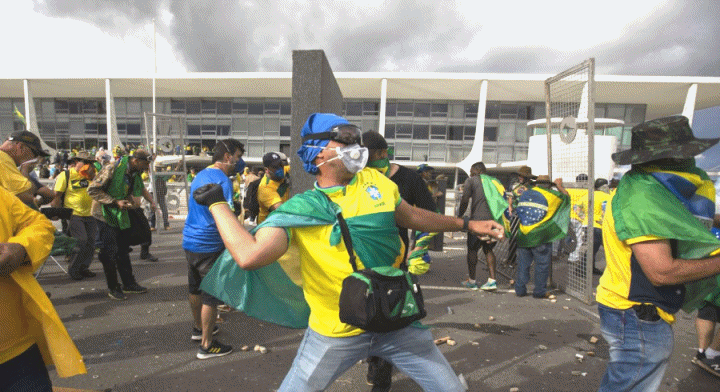THE ATTACK ON PLACES OF POWER ORTHE HOLD OF BOLSONARISM INBRAZILIAN SOCIETY | |
Facts The area near the Three Powers Square, where the Presidential Palace of Planalto, the Supreme Court and the Congress meet, had been cordoned off by the authorities, but the Bolsonarists managed to break the security cordons. The police, who seemed completely overwhelmed, tried, in vain, to repel them with tear gas and stun grenades. After several hours of chaos, security forces finally regained control of the invaded buildings and arrested more than 200 people, according to Justice and Security Minister Flavio Dino. The message from the bolsonarists seems clear: they do not intend to give up, despite his investiture last week. These activists have never recognized the victory - by a short head - of Lula against Jair Bolsonaro in the presidential election of October. This rampage comes a week after the inauguration of the new Brazilian president and this, in the absence of his predecessor: the far-right leader left Brazil at the end of the year to join the United States, thus fleeing trouble. judicial. President Lula's reaction The Brazilian president very quickly announced on Sunday a “federal intervention” – that is to say the takeover at the level of the Brazilian state of the command of the security forces – to regain control of the security of the capital. The day after this invasion "unprecedented in the history of Brazil", Lula met with the presidents of the Senate, the Chamber of Deputies and the Supreme Court at the Presidential Palace of Planalto. The interview concluded with a joint statement calling for "the defense of democracy". Condemning an intervention carried out by "fascist vandals", he promised, about those responsible, "to find them all", assuring that they would be "punished" The icon of the Brazilian left estimated Sunday that his predecessor Jair Bolsonaro had "encouraged" the "fascist vandals" to carry out this action. Jair Bolsonaro reacted from Florida From the United States, Jair Bolsonaro has, in a series of tweets, condemned “the depredations and invasions of public buildings”. But he also "rejected the accusations, without proof" of his successor that he had encouraged the violence. Several of his allies, however, dissociated themselves from the violence, including Valdemar Costa Neto, president of the PL, Bolsonaro's party, who regretted "a sad day for the Brazilian nation". The governor of the Federal District of Brasilia, Ibaneis Rocha, another ally of Jair Bolsonaro, even apologized to President Lula in a video. He called those responsible for the depredations of public buildings "real vandals" and "real terrorists". Unanimous condemnation from the international community The Brazilian president can count on the support of the international community. The international community has massively condemned the attack on these symbols of Brazilian political life. US, Canadian and Mexican leaders condemned the attacks and assured Lula of their support, in a joint statement Monday. Argentine Pope Francis also denounced the violence. Joe Biden called the violence of the demonstrators "scandalous". “Using violence to attack democratic institutions is always unacceptable,” also tweeted its Secretary of State Antony Blinken. Mexican President Andrés Manuel Lopez Obrador for his part denounced “the conservative coup attempt in Brazil”. The President of the European Council Charles Michel expressed on Twitter his "absolute condemnation" of this assault and his "total support for President Lula da Silva, democratically elected by millions of Brazilians after fair and free elections". The lasting hold of Bolsonarism on Brazilian society But it should be remembered that Lula only won the second round of the presidential election in Brazil by a narrow margin against incumbent President Jair Bolsonaro, at the end of a campaign marred by unrest until last day. And this extremely tense campaign will have confirmed the lasting hold of Bolsonarism on Brazilian society. Bolsonarism is not dead as shown by researchers Bruno Ronchi (University of Rennes) and Lucas Camargo Gomes (Federal University of Paraná in Brazil) in an article published in TheConversation “ What future for Bolsonarism? » of which here are the analyses. Indeed, despite the resurgence of food insecurity, the almost 700,000 deaths caused by the Covid-19 pandemic and the increase in deforestation, Jair Bolsonaro and his government have maintained strong popularity with the public throughout his mandate. an important part of the population. The last Datafolha poll organized before the election indicated that 38% of Brazilians considered the government "good" or "very good", while 22% considered it "average" and 39% "bad" or "very bad". where 48% of voters have a household income of two minimum wages or less, the support of the popular electorate remains fundamental to maintaining Bolsonaro's electoral potential. In fact, adherence to the discourse of Bolsonarism is still widespread in the country, which sees the leader and his supporters as soldiers in the fight against “the system”. This “system” includes, among others, higher education institutions, judicial institutions, national and international NGOs, and even the United Nations. In addition, Bolsonarist discourse insists on the need to moralize Brazilian society. This moralization revives the memory of the corruption scandals that erupted during the governments of the Workers' Party and exalts traditional values - as evidenced by the oft-repeated Bolsonarist slogan, "God, fatherland and family". Bolsonaro then appears as the only one who can fight against these forces and "heal" Brazil by ridding it of a deeply corrupt system . In addition, it is important to highlight the economic and moral support provided to Bolsonaro by certain sectors, such as part of the Evangelical Churches (in particular Pentecostals), agribusiness, the business world, the police and the government. 'army. The attitude of some members of the security forces during the assault has also questioned observers. Haven't some been complacent towards the demonstrators? The metal barriers protecting the modernist buildings with large bay windows were easily broken down by the Bolsonarist militants who met practically no resistance from the police. Police officers even cleared the way for the demonstrators, whom they escorted to the Place des Trois-Pouvoirs. It is that the armed forces in the very broad sense are also divided and are in a conflict of loyalty with regard to the legitimation of the central power. "Bolsonorisation of the State apparatus"? The body of the military police is infiltrated by the Bolsonarists or in any case very sensitive to the theses of the extreme right: according to a recent study by the Brazilian Forum of Public Security, 27% of the members of this body interact on social networks with Jair Bolsonaro's most radical activists. This body is the largest police force in the country: approximately 500,000 men with one military police per state. In this case, during these assaults on the institutions, it was therefore the military police of the state of Brasilia, the capital, whose governor and head of public security, suspected of sympathy with the insurgents, were relieved of their duties last night. The name "military police" is misleading: it is really a police force, responsible for maintaining order. The army, on the other hand, is a federal body and so far in any case, it presents a legalistic face and respectful of democratic institutions; the barracks remained calm, despite the calls from the foot of Bolsonarist militants who demand a "military intervention". Moreover, by deciding to place Brasilia under federal control, President Lula has de facto decided to trust the army, rather than the military police. How can Lula govern? Certainly Lula has already started the sweep. Brasilia's police chief, Anderson Torres, a Bolsonarian former justice minister, was removed from his post. As of Sunday evening, Supreme Court Justice Alexandre de Moraes suspended for 90 days the governor of the district of Brasilia, Ibaneis Rocha, who had appointed Torres. But if Lula has won the presidential election, he must deal with a Congress where the support of the ex-president is numerous and the federated states are mainly won over to Bolsonaro. Lula will therefore have to work to regain control of the “state apparatus” (police, armies), infused with Bolsonarist ideas, states Maud Chirio, lecturer, specialist in the history of the Brazilian military dictatorship. . "Lula is faced with a bolsonarization of the state apparatus which can prevent him from governing", analyzes the researcher. The long term effects But given the Bolsonarist entrenchment in Brazilian society, it is important to consider the short and long-term effects it produces on this young democracy, according to the two researchers Bruno Ronchi and Lucas Camargo Gomes. The incessant attacks directed at the other powers, in particular the Supreme Court, accentuate the distrust of the institutions whose mission is to safeguard the rule of law. Anchored in the 1988 Constitution, the promulgation of which seals the end of the military dictatorship, this institutional framework showed signs of corrosion long before Bolsonaro came to power. Faced with the succession of crises and reconfigurations that have occurred over the past decade, marked by the dismissal of Dilma Rousseff in 2016, as well as numerous corruption scandals, widespread discontent is becoming more and more palpable. Bolsonarism then appears as the expression of antipolitics, starting from the idea that all those who submit to the system are corrupt... “The scenarios that are emerging for the future of Brazilian democracy do not suggest a “return to democratic normality” that is easy to operate. The phenomenon currently observed is characterized much more by the destructuring of a historically situated institutional framework which was already showing its limits. “, conclude the researchers. "Even if Lula's victory were accepted by Bolsonaro and his supporters, it would take substantive work by the new government to readapt to new methods of political action, in the face of a Bolsonarist opposition that will undoubtedly be fierce and determined to return to power as soon as possible. » |
|
| Garett Skyport for DayNewsWorld | |
 |
|




